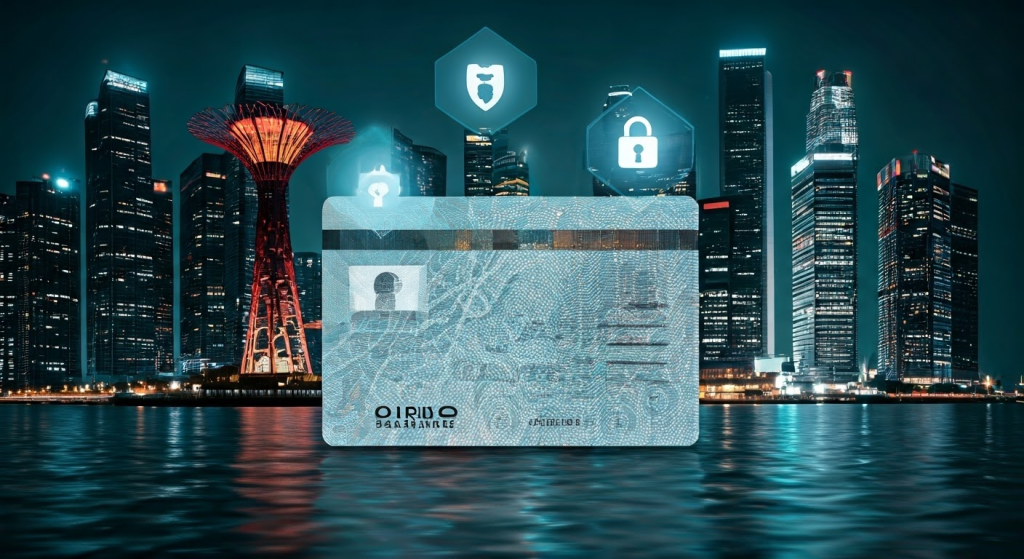
Key Highlights
- Singapore’s National Registration Identity Card (NRIC) number is a crucial element of the city-state’s healthcare and education sectors.
- These nine-character identification numbers ensure efficient service delivery and facilitate accurate record management.
- However, the use of NRIC numbers necessitates a firm commitment to safeguarding individuals’ privacy and ensuring data security.
- The Singapore government has implemented stringent measures to regulate how personal data, including NRIC numbers, is collected, used, disclosed, and protected.
- This comprehensive blog post explores the multifaceted ways NRIC numbers are used in healthcare and education and examines the associated challenges and solutions.
Other Tool : NRIC Generator | NRIC Validator | Bulk NRIC Generator | Bulk NRIC Validator | NRIC Barcode Generator
Introduction
The Singapore government understands that the NRIC number is important. It is a unique and irreplaceable identifier that helps deliver services better in many areas. The use of NRIC numbers helps identify people accurately and makes linking records easier. This also helps to simplify administrative tasks and prevent unauthorized access to privileged information. However, since NRIC numbers are sensitive, the government works hard to manage this data carefully. They have set up a strong system to ensure that the use of NRIC numbers is responsible and ethical, especially in healthcare and education.
Understanding NRIC Numbers in Singapore
In Singapore, the individual’s physical NRIC number is a special 9-character ID given to every citizen and permanent resident. It is important in daily life. The NRIC number helps with transactions, identity checks, and accessing services from both public and private sectors. This system started in 1965. It shows the government’s goal to improve security and help the young nation’s growth.
However, the wide use of NRIC numbers raises important questions about balancing usefulness and privacy. As Singapore moves into a digital future, it is very important to think about how to use NRIC numbers carefully. We must protect individual rights while also keeping high ethical standards.
The Structure and Purpose of NRIC Numbers
The NRIC is not just a card. It represents Singaporean identity. It shows the country’s effort to be efficient and organized. Every citizen and permanent resident has a unique NRIC number. This 9-character number is made of letters and numbers. It helps people access many services like healthcare and education.
Singapore’s NRIC system is known for being reliable and advanced. It is carefully made to reduce mistakes and stop fraud. This system supports the country’s strong administrative structure.
Still, using one powerful identifier raises concerns about privacy and data security. As Singapore grows in the digital age, it needs to regularly check and improve the NRIC system. This way, it can be a tool for growth without risking individual freedoms.
Legal Framework Governing NRIC Numbers
Singapore’s Personal Data Protection Act (PDPA) is the foundation of how the country handles data privacy in the public sector. It was created in 2012 and sets rules for collecting, using, sharing, and protecting personal data, including people’s NRIC numbers. The Corporate Regulatory Authority (CRA) makes sure that companies follow PDPA rules and treat personal data properly.
According to the PDPA, companies need to get clear consent before they can collect, use, or share a person’s NRIC number or make copies of the NRIC. There are a few exceptions, like when the disclosure of NRIC numbers is required by law or to avoid causing harm. If someone shares the NRIC number without permission, there can be serious penalties. This shows how important Singapore considers data protection to be.
This commitment to legal protections highlights Singapore’s focus on promoting responsible data management. The availability of such information is crucial for keeping the public’s trust and for ensuring that people feel safe when sharing their personal information.
NRIC Numbers in the Healthcare Sector
Singapore’s healthcare system is well-known around the world for being efficient and providing high-quality care. One important reason for this success is the use of NRIC numbers. These numbers help identify patients clearly and manage their records accurately.
With NRIC numbers, healthcare workers can quickly and reliably find patients’ important medical histories. This reduces mistakes and helps in giving care on time. This smooth system helps patients move easily through registration, treatment, and follow-up care.
How NRIC Numbers Facilitate Patient Identification and Records Management
Imagine walking into a local healthcare center and being quickly identified using just your NRIC number. In Singapore, this special number helps in easily recognizing patients at local healthcare institutions and managing their records, including recent appointment records. When you show your NRIC, you get immediate access to your medical records. This means no more manual searches and fewer chances of mistakes in identifying people.
With the NRIC number used in healthcare, medical staff can quickly find out a patient’s medical history, allergies, current medications, a person’s medical condition, and past treatments. This easy access to information helps doctors make better decisions. It ensures you receive the right care and reduces the chances of negative reactions.
Additionally, using the NRIC number helps maintain the accuracy and reliability of patient IDs, which improves the overall quality of data in the healthcare system. It helps create complete patient records. This helps doctors track health trends and treatment results easily. It leads to a better understanding of diseases and results in improved healthcare for everyone.
Privacy and Security Measures for NRIC Numbers in Healthcare
Given how sensitive healthcare information is, Singapore has put strict rules in place to protect people’s data, especially for public agencies within the healthcare system. This is especially important for the use of NRIC numbers in healthcare, where keeping information private is vital. The PDPA is the main law ensuring protections for personal data in healthcare. It requires strong cybersecurity steps to stop unauthorized access or changes to personal information.
Healthcare organizations must use the right tools and plans to protect NRIC numbers and sensitive patient data. This may include using encryption, setting access limits, and doing regular security checks to lower the chance of data breaches. Moreover, access to patient data is tightly managed. Only authorized staff members who need to see this information for care purposes are allowed to do so. Regular training for healthcare workers helps emphasize the importance of handling data properly, reducing the chances of breaches.
These strong privacy and security steps show Singapore’s dedication to managing data well in healthcare. By focusing on data protection, Singapore aims to build public trust, helping its citizens feel secure that their personal health information is handled safely.
NRIC Numbers in the Education System
In Singapore, NRIC numbers are very important not just in healthcare but also in education. They help schools with student enrollment, tracking progress, and running smoothly.
Using a unique identifier from early education makes it easy to transfer student records between schools. This helps maintain continuity and supports personalized learning plans. Schools can use the connection provided by NRIC numbers to manage student information well. They can monitor how students are doing, handle exams, and use resources more efficiently.
Role of NRIC Numbers in Student Enrollment and Tracking
From the moment a child starts school in Singapore, their NRIC number becomes important for their education. This special number helps with enrollment, makes office tasks easier, and helps track academic progress efficiently. Schools, from primary levels to universities, use NRIC numbers to create detailed student profiles. This ensures they keep accurate records throughout the student’s learning journey.
Using NRIC numbers as unique identifiers helps avoid confusion, especially in schools with many students who may have similar names. This accuracy helps ensure that students receive the substantial financial aid they deserve for their work and that their academic records are correct.
Also, tracking a student’s education with one consistent identifier allows for a better understanding of what they need and how they are doing. This data-driven method helps teachers and policymakers create focused support and better educational programs to suit each student’s strengths and weaknesses.
NRIC Numbers and Data Protection in Educational Institutions
Making sure we use NRIC numbers safely in schools is very important, and Singapore takes this public education effort seriously. The Personal Data Protection Commission (PDPC) wants schools to have strong measures to protect data. This means only allowing access to student information for those who need it. The Association of Banks also emphasizes that only authorized staff should see NRIC numbers and other sensitive data.
The PDPC gives schools and universities advice on how to store and send data securely. They suggest using encryption, secure servers, and access controls to protect student data, including NRIC numbers, from unauthorized access and breaches.
By encouraging a culture of awareness about data protection, Singapore helps teachers learn how to handle student data responsibly. This way, NRIC numbers are used ethically while keeping a safe space for students to learn and grow.
The Challenges and Solutions for NRIC Number Usage
The use of NRIC numbers is common and brings many benefits. However, it also creates challenges. One main issue is finding a balance between using these numbers for service and keeping personal information safe.
It is important to keep educating the public about data protection. This means teaching people about the best practices for handling data. It also involves highlighting potential threats to their information. By involving the public and building a sense of awareness, Singapore aims to help individuals take an active role in protecting their data.
Balancing Accessibility with Privacy Concerns
Singapore uses the NRIC number for smooth service delivery. However, we need to be careful about privacy concerns in our digital world, as relying solely on it can create a false sense of security. We must find a good balance, particularly regarding the disclosure of the NRIC number. This can be done by using technology that increases security but does not make access harder. One way to tackle this is by looking at different ways to identify people without needing to share full NRIC numbers.
Methods like anonymization and data encryption are key to protecting people’s privacy. Anonymization can hide or remove identifiable information from datasets that include NRIC numbers. This way, we can analyze data without revealing anyone’s identity. Strong encryption ensures that if someone accesses data without permission, it remains unreadable and useless.
Raising public awareness is also very important. We need to educate people about their data rights and the need to protect personal information. It’s essential to share the potential risks of NRIC misuse. By promoting a community that values careful data use, Singapore can lessen privacy concerns and still enjoy the benefits of its unique identifier system, the NRIC.
Innovative Practices in Handling NRIC Numbers
As Singapore continues its digital development, exploring innovative practices for handling NRIC numbers is critical. One solution gaining traction is the use of ACRA’s new Bizfile portal with “masked” or partial NRIC numbers. This approach involves revealing only certain digits of the full NRIC number, enough to verify an individual’s identity without exposing the entire sequence, thus reducing the risk of identity theft or unauthorized data access. The availability of such algorithms online to decipher these numbers raises additional concerns, indicating a need for robust security measures.
|
Innovative Practice |
Description |
Benefits |
|
Masked NRIC Numbers |
Displaying only a portion of the full NRIC number |
Reduces exposure of the entire NRIC sequence, offering a balance between identification and privacy. |
|
Digital Identity Verification Systems in financial institutions |
Leveraging biometric authentication, such as fingerprint or facial recognition, to verify identity. |
Eliminates the need to share physical NRICs, enhancing convenience and security. |
|
Data Encryption and Tokenization |
Converting sensitive data, including NRIC numbers, into an unreadable format. |
Ensures that even if data is breached, it remains unusable, safeguarding individuals’ privacy. |
These practices, coupled with ongoing research and development in data security, are paving the way for a future where Singaporeans can enjoy the benefits of a digitally connected society without compromising their privacy.
Conclusion
In conclusion, it’s important to understand how NRIC numbers help in healthcare and education in Singapore. These numbers make it easier to identify patients and manage students. Privacy and security are very important, and people are working on new ways to solve problems. Keeping a balance between being accessible and protecting privacy is key. By using strong safeguards and knowing about data protection, you can help protect your personal information. If you worry about how your NRIC number is used, take steps to prevent any misuse and protect your privacy.
Frequently Asked Questions
Why are NRIC numbers so important in Singapore’s healthcare and education sectors?
In Singapore, the NRIC number is an important identifier. It makes processes easier in healthcare and education. Using the NRIC number helps to make things accurate, quick, and smooth for service delivery.
How are individuals’ privacy protected when their NRIC numbers are used?
Singapore has strict privacy rules under the PDPA. This means private sector organisations must exercise a duty of care when handling NRIC numbers. They use strong protections, like data encryption and limited access. These steps help reduce the chance of data breaches and keep personal information safe.
What should you do if you believe your NRIC number has been misused?
If you think someone is using your NRIC number wrongly, report it to the police and the Personal Data Protection Commission (PDPC) right away. Get legal advice to learn about your rights and choices under the Personal Data Protection Act.


